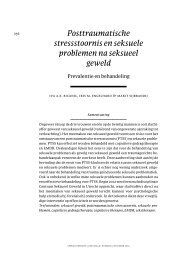Havens_Wake_Up_To_Rape_Report_Summary
Havens_Wake_Up_To_Rape_Report_Summary
Havens_Wake_Up_To_Rape_Report_Summary
Create successful ePaper yourself
Turn your PDF publications into a flip-book with our unique Google optimized e-Paper software.
<strong>Wake</strong> <strong>Up</strong> <strong>To</strong> <strong>Rape</strong> Research<strong>Summary</strong> <strong>Report</strong>Prepared By:Opinion MattersPrepared For:The <strong>Havens</strong> (Sexual Assault Referral Centres)Opinion Matters • Northburgh House, 10 Northburgh Street, London, EC1V 0ATTel: 020 7251 9960 Fax: 020 7253 8885Opinion Matters is a trading name of markettiers4dc Ltd
MethodologyAccreditationOpinion Matters / Tickbox.net comply with the Code of Conduct (2005) as set out by theMarket Research Society. Within these parameters there are guidelines that ensure allresearch is carried out in a professional and ethical manner. Furthermore as members ofESOMAR and AIMRI Opinion Matters abide by the ICC/ESOMAR International Code onMarket and Social Research.Online MethodologyOpinion Matters surveyed a random sample of 1061 people in London aged 18 to 50 online.The sample includes 349 men, 712 women, 213 aged 18 to 24, 386 aged 25 to 34 and 462aged 35 to 50. The sample also included 922 heterosexual, 71 homosexual, 52 bisexual and16 asexual respondents.Using the Internet for ResearchThe use of online as a method of accessing people for survey based research has increaseddramatically as a result of the access we have to the internet. For example, within the UK “In2008, 33.9 million adults (71% of the UK adult population) accessed the internet in the threemonths prior to interview. This was an increase of 6.6 per cent (2.1 million adults) from 2007”(www.statistics.gov.uk). Similar stories are to be seen globally.Therefore the internet has become a valuable source for accessing large numbers ofrespondents due to its ability to have a wide reach whilst being extremely cost and timeeffective. The internet has facilitated the gathering of robust samples as well as those whichare nationally representative.Self Administered InterviewsA valuable reason for using online is that the anonymity the respondent feels allows for thegeneration of more ‘truthful’ responses. Respondents are free to answer the questionswithout the immediate influence of an interviewer or observer. They are also not restricted bytime constraints as the respondent can take their time navigating through an online survey.This positive online may be especially useful when surveying topics of a particularly sensitivenature.Secondly, another advantage of self completion interviews is that the questions are alwaysstandardised, i.e. each respondent is presented with exactly the same question asked in thesame format. Online prevents any interviewer bias arising through the use of more than oneinterviewer on a research project.Also, online is a great portal for accessing attitudinal based information and comparing this topeople’s actions. For example, do we find that the majority of people in the UK areunconfident about their knowledge about a particular topic area? But establish that the normis for a high level of awareness when looking at behavioural trends? Page 3
Are you keeping safe?There are precautions we can all take against the possibility of an assault, but Londonersit would seem are still quite blasé when it comes to being safe. For example: Almost a half of Londoners have walked home via back streets on their own months (46%) Over a quarter have left a drink unattended in a bar (26%) One in five has been so drunk they have lost their memory of an evening (20%) One in five have got into a taxi without checking that is it licensed (20%)Men are taking far more risks than women; they are more likely to have: Walked home via back streets on their own (58% vs. 40%) Left a drink unattended at a bar (34% vs. 23%) Been so drunk they have lost their memory of the evening (26% vs. 17%) Got into a cab without checking it was licensed (24% vs. 18%) Gone back to a person’s home that they just met that night (16% vs. 7%)As Londoners get older, they begin to take fewer risks. The 18 to 24 year olds are mostlikely of all the age ranges in the last 12 months to have:Walked home via back streets on their own (58% vs. 37% of 35 to 50 year olds)Got into a cab without checking it was licensed (27% vs. 12% of 35 to 50 year olds)Been approached by a stranger late at night when alone (24% vs. 11% of 35 to 50 year olds)Gone back to a person’s home that they just met that night (15% vs. 5% of 35 to 50 yearolds)The 25 to 34 year olds are most likely in the last 12 months to have:Left a drink unattended at a bar (31% vs. 21% of 35 to 50 year olds)Been so drunk they have lost their memory of the evening (26% vs. 14% of 35 to 50 yearolds)In London, sexuality also has a bearing on the risks people take:People who classify themselves as bisexual are most likely in the last 12 months to have:Walked home via back streets on their own (60% vs. 45% of heterosexual respondents)Left a drink unattended at a bar (42% vs. 25% of heterosexual respondents)Been so drunk they have lost their memory of the evening (25% vs. 19% of heterosexualrespondents)Been approached by a stranger late at night when alone (25% vs. 13% of homosexualrespondents)People who classify themselves as homosexual are most likely in the last 12 months tohave:Got into a cab without checking it was licensed (30% vs. 19% of 35 of bisexual respondents)Gone back to a person’s home that they just met that night (21% vs.9% of heterosexualrespondents) Page 4
What would you do?When asked what you would do if sexually assaulted or raped, worryingly not allLondoners would take action. Some would do nothing at all and keep it to themselves. One in twenty-five Londoners would do nothing and keep a sexual assault or rape tothemselves (4%) Few people would go to an official port of call such as calling a helpline (15%), going to<strong>Havens</strong> (3%) or to a doctor (38%) Almost two thirds of Londoners would not even tell their partner (62%)When asked specifically about reporting a sexual assault or rape to the police a significantnumber of respondents were unsure:Over one in ten claimed they would ‘maybe’ report it to the police (13%) and one in twentyadmitted they didn’t know (5%)One in fifty respondents were clear that they would not report a case of rape or sexualassault to the police (2%)79%13%5%2%0 10 20 30 40 50 60 70 80YesMaybeI don't knowNoThis begs the question; why? What is it that prevents people from letting the police know?The main reasons are: I would be too embarrassed / ashamed of what had happened (55%) I would just want to forget it ever happened (41%) I wouldn’t want to go to court (38%) I would be afraid of repercussions from the assailant (31%) I would be afraid that my family would find out (25%) Page 5
Men are more likely than women to be too embarrassed (62% vs. 53%) and fearrepercussions from the assaulter (34% vs. 29%)The 18 to 24 year olds are most likely to choose all reasons for not wanting to approach thepoliceSome open responses to this question were:“The rape conviction rate here is the lowest in Europe. I wouldn't want to relive the experience incourt, and have to be in the same room as my assaulter, considering the odds of getting aconviction are so low. Prison time is so low even if a conviction”“I would be afraid of being demoralised by the police and society during court proceedings, whybother when they are just going to get off the charges anyway?”“I am not sure whether I would be taken seriously and the follow through procedure would bethorough”“My statement of truth being doubted”“<strong>Rape</strong> victims rarely get justice”Although Londoners would not report a rape or assault on themselves, they wouldhowever offer advice to a friend if they had confided in them about such an assault.The vast majority of Londoners would advise their friends to seek immediate medicalattention if they had been sexually assaulted (96%)96%3%1%0 20 40 60 80 100Yes I don't know No Page 6
What have you experienced?Shockingly, over a third of Londoners have been in a situation where they could havebeen made to have sex when they didn’t want to (34%) Women are twice as likely as men to have been in this situation (40% vs. 20%)Male80%20%Female60%40%0 10 20 30 40 50 60 70 80NoYesAge does not have a significant affect on whether Londoners have been in a situation wherethey could have been made to have sex and did not want toPeople who are bisexual are the most likely to have been in this situation (48% vs. 31% ofthose who are asexual)How many people have actually been in the situation of being made to have sex when theydidn’t want to? One out of five adults in London have been in a situation where they were made to have sexwhen they didn’t want to (20%) More women than men have been made to have sex when they didn’t want to (23% vs. 15%) More bisexual adults have been made to have sex when they didn’t want to than any othersexuality (35% vs. 18% of people who are heterosexual) Page 7
Who would you believe and whose fault is rape?The research has shown that Londoners are cynical about rape claims: Close to one in five respondents agree with the statement,” most claims of rape are probablynot true” (18%) Men are almost twice as likely to take this viewpoint than women (27% vs. 14%) People who are heterosexual are less likely to agree that “most claims of rape are probablynot true” (16% vs. 44% of people who are asexual)People in London are not even sure what can count as rape or who should acceptresponsibility for it:Close to one in five respondents do not know whether in a committed relationship it is rapewhen a man makes their partner have sex when they don’t want to (18%)One in ten do not believe it is rape when a man makes their partner have sex when they don’twant to (10%)The older generation are most likely to agree that this situation is in fact rape (76% of 35 to50 year olds vs. 68% of 18 to 24 year olds)68%18 - 2418%15%69%25 - 3419%12%76%35 - 5017%7%0 10 20 30 40 50 60 70 80Yes I don't know No Page 8
There are many situations in which some people feel that a person should takeresponsibility for being raped. Over half (56%) of those surveyed think that there are somecircumstances where a person should accept responsibility. Of those people thecircumstances are: Performing another sexual act on them (73%) Getting into bed with a person (66%) Drinking to excess / blackout (64%) Going back to theirs for a drink (29%) Dressing provocatively (28%) Dancing in a sexy way with a man at a night club or bar (22%) Acting flirtatiously (21%) Kissing them (14%) Accepting a drink and engaging in a conversation at a bar (13%)73%66%64%29%28%22%21%14%13%0 10 20 30 40 50 60 70 80Performing another sexual act on themGetting in to bed with a personDrinking to excess / blackoutGoing back to theirs for a drinkDressing provocativelyDancing in a sexy way with a man at a nightclub or barActing flirtatiouslyKissingthemAccepting a drink and engaging in conversation at a barWomen are less forgiving than men. They are more likely to think that a person shouldaccept responsibility when: Performing another sexual act on them (75% vs. 70%) Getting into bed with a person (71% vs. 57%) Going back to theirs for a drink (35% vs. 19%) Dressing provocatively (31% vs. 23%) Dancing in a sexy way with a man at a night club or bar (23% vs. 19%) Accepting a drink and engaging in a conversation at a bar (15% vs. 11%) Page 9
The younger generation, the 18 to 24 year olds are also most likely to think a personshould accept responsibility in different scenarios. They are more likely to think that aperson should accept responsibility when:Getting into bed with a person (68% vs. 63% of 25 to 34 year olds)Going back to theirs for a drink (39% vs. 22% of 35 to 50 year olds)Dressing provocatively (33% vs. 25% of 35 to 50 year olds)Dancing in a sexy way with a man at a night club or bar (29% vs. 18% of 35 to 50 year olds)Kissing them (23% vs. 8% of 35 to 50 year olds)Accepting a drink and engaging in a conversation at a bar (20% vs. 7% of 35 to 50 year olds) Page 10







